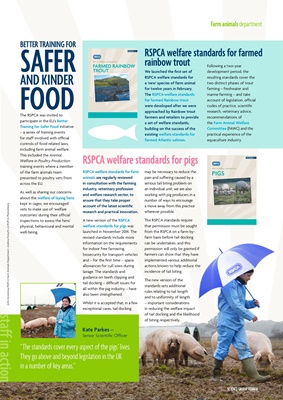
Farm animals department
John Avizienius/RSPCA Farm Animals Department. Andrew Forsyth x2/RSPCA Photolibrary
BETTER TRAINING FOR
SAFER AND KINDER
FOOD The RSPCA was invited to
participate in the EU's Better
Training for Safer Food initiative
- a series of training events
for staff involved with official
controls of food related laws,
including farm animal welfare.
This included the Animal
Welfare in Poultry Production
training events where a member
of the farm animals team
presented to poultry vets from
across the EU.
As well as sharing our concerns
about the welfare of laying hens
kept in cages, we encouraged
vets to make use of 'welfare
outcomes' during their official
inspections to assess the hens'
physical, behavioural and mental
well-being.
RSPCA welfare standards for farmed
rainbow troutWe launched the first set of
RSPCA welfare standards for
a 'new' species of farm animal
for twelve years in February.
The RSPCA welfare standards
for farmed Rainbow trout
were developed after we were
approached by Rainbow trout
farmers and retailers to provide
a set of welfare standards,
building on the success of the
existing welfare standards for
farmed Atlantic salmon.
Following a two-year
development period, the
resulting standards cover the
two distinct phases of trout
farming - freshwater and
marine farming - and take
account of legislation, official
codes of practice, scientific
research, veterinary advice,
recommendations of
the Farm Animal Welfare
Committee (FAWC) and the
practical experience of the
aquaculture industry.
RSPCA welfare standards for pigs
Kate Parkes -
Senior Scientific Officer
"The standards cover every aspect of the pigs' lives.
They go above and beyond legislation in the UK
in a number of key areas."
staff in action
RSPCA welfare standards for farm
animals are regularly reviewed
in consultation with the farming
industry, veterinary profession
and welfare research sector, to
ensure that they take proper
account of the latest scientific
research and practical innovation.
A new version of the RSPCA
welfare standards for pigs was
launched in November 2014. The
revised standards include more
information on the requirements
for indoor free farrowing,
biosecurity for transport vehicles
and - for the first time - space
allowances for cull sows during
lairage. The standards and
guidance on teeth clipping and
tail docking - difficult issues for
all within the pig industry - have
also been strengthened.
Whilst it is accepted that, in a few
exceptional cases, tail docking
may be necessary to reduce the
pain and suffering caused by a
serious tail biting problem on
an individual unit, we are also
working with pig producers in a
number of ways to encourage
a move away from this practice
wherever possible.
The RSPCA standards require
that permission must be sought
from the RSPCA on a farm-byfarm
basis before tail docking
can be undertaken, and this
permission will only be granted if
farmers can show that they have
implemented various additional
actions known to help reduce the
incidence of tail biting.
The new version of the
standards sets additional
rules relating to tail length
and to uniformity of length
- important considerations
in reducing the welfare impact
of tail docking and the likelihood
of biting respectively.
13 SCIENCE GROUP REVIEW 2014